Jack Ketchum Talks About the Horrors That Live 'Next Door'
By, Richard Hipson
"The first authentically shocking American film I've seen since 'Henry: Portrait of a Serial Killer' over 20 years ago. If you are easily disturbed, you should not watch this movie. If, on the other hand, you are prepared for a long look into hell, suburban style, 'The Girl Next Door' will not disappoint. This is the dark-side-of-the-moon version of 'Stand By Me'." - Stephen King
Fans of Jack Ketchum know that The Girl Next Door, his controversial novel inspired by the 1965 real-life murder of Sylvia Likens, is not only a shocking and disturbing work of fiction but also acts as a reminder of the real-life monsters lurking in suburbia and undetected by anyone with the ability to make a difference. The Girl Next Door takes place over the course of  several months in small-town America where an orphaned 14-year-old girl is taken in by a trusted family member and is subsequently tied up and gagged, beaten, and tortured to death in the basement. Although the film adaptation is by no means a shortcut down the twisted streets of human depravity found in Ketchum’s novel, early word indicates that the film is as healing as it is unsettling. DSM contributor Richard Hipson sat down with Jack Ketchum to discuss his involvement in and reaction to The Girl Next Door film adaptation, slated for release on DVD from Anchor Bay this December.
several months in small-town America where an orphaned 14-year-old girl is taken in by a trusted family member and is subsequently tied up and gagged, beaten, and tortured to death in the basement. Although the film adaptation is by no means a shortcut down the twisted streets of human depravity found in Ketchum’s novel, early word indicates that the film is as healing as it is unsettling. DSM contributor Richard Hipson sat down with Jack Ketchum to discuss his involvement in and reaction to The Girl Next Door film adaptation, slated for release on DVD from Anchor Bay this December.
Dark Scribe Magazine: What is it that you think makes The Girl Next Door such an effective adaptation?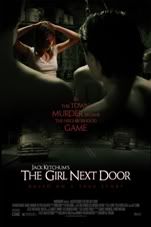
Jack Ketchum: It's almost all about the script. That's your bedrock. A movie can get screwed up in dozens of ways, but without a good script to begin with it's inevitably that it'll be a turkey. What makes The Girl Next Door different is that in so many ways the script is both good and different. Almost the entire movie is flashback, for one thing. Another is that most of the characters are kids - and you almost never see a cast of kids in a movie this cruel and dark. The only one that springs to mind is Lord of the Flies. Finally, of course, there's the subject matter.
Dark Scribe: How did [producer] Andrew van den Houten come to work on this project and what gave you the confidence that his Moderncine Company was going to be the right choice for this film project?
Jack Ketchum: Andrew read the book on vacation and immediately knew he wanted to adapt the book. He got in touch with me, and I told him that a really fine script already existed. He sent me a copy of Headspace and I thought it was quite good, pretty damn professional, with very good production values - with the exception of the monster, which suffered because of budget issues. But since the monsters in my book were people, I knew that wasn't going to be a problem. But what finally clinched the deal for me was when I sat down with him and Bill Miller over the script and drinks and we traded ideas. I liked theirs and they liked mine. Plus, we just clicked as people. I figured Girl was in good hands.
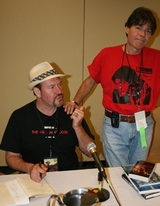
Screenwriter Philip Nutman and Jack Ketchum. (Photo: Steve Speigal)
Dark Scribe: As many of your fans are aware, there had been a script for The Girl Next Door floating around with Phil Nutman’s name attached for a number of years. Why was it so important that this script be used as a blueprint for the movie, so much so that you made it part of your deal to option the film rights to Andrew?
Jack Ketchum: I never felt anybody would ever dare to do a film of this book in the first place and that my friend Phil Nutman and his partner Dan Farrands were probably nuts to try. But if they wanted to, why not? Then, what they came up with was so much better than even I could have done or dreamed they'd do that when Andrew came to me I insisted. Like I said, it's the bedrock thing. But it didn't take much persuading. The script spoke eloquently for itself.
Dark Scribe: The real-life tragic story of Sylvia Likens – from which your story is inspired – took place in 1965, yet your story is set in 1958. Why is that?
Jack Ketchum: I'd been sitting on the notion of writing about Gertrude and Sylvia for years, ever since I read about them in Jay Robert Nash's Bloodletters and Badmen. In fact, that scary photo of a ruined, almost skeletal Gert in the book was really what continued to haunt me. But I didn't know anything about Indianapolis and couldn't quite get a handle on how to do it. Then, when my mother died, I had to return home to New Jersey quite often for extended periods of time to sell the house I grew up in and to settle her affairs. I did a lot of reminiscing and noticed that the street and the houses hadn't changed much since the post-World War II days. And at some point, I guess I had a kind of eureka moment and thought, hey, when I was growing up this was a goddamn dead end street. One where everybody knew everyone else’s business, yet nobody told any outsiders - this could easily have happened right here back then! I was 12 the summer of '58. So I thought, what I'll do is make myself a little memory-play here and insert Gertrude, Sylvia and all the rest into my own and my friends' experiences back then. No research to speak of, just memory. My own house would become Gert's house, where most of the action takes place and which I know every inch of, and my friends' house next door would become David's. Even the title came to me ready-made, The Girl Next Door.
Dark Scribe: Describe for our readers your experience being on set and sharing the stage as this tragic tale came to life
Jack Ketchum: My first day on the set was amazing. They were  shooting in the cellar, scenes with David creeping down the stairs, which were fine - but then they started shooting Meg tied to the rafters, already in extreme pain. It was a close-up of her face, filthy, gagged and blindfolded, and I watched it from a monitor. And Blythe was so damn good she scared me. And then she made me cry. Really cry. Nothing I ever saw in the subsequent days I was on set ever topped that. But I knew that what I was seeing was good. It needs to be said that [director] Greg Wilson's really fine on-set. He knew exactly what he wanted and went about getting it with a kind of Zen calm that I never saw ruffle even at major setbacks like during the carnival scene when the shooting was delayed for hours.
shooting in the cellar, scenes with David creeping down the stairs, which were fine - but then they started shooting Meg tied to the rafters, already in extreme pain. It was a close-up of her face, filthy, gagged and blindfolded, and I watched it from a monitor. And Blythe was so damn good she scared me. And then she made me cry. Really cry. Nothing I ever saw in the subsequent days I was on set ever topped that. But I knew that what I was seeing was good. It needs to be said that [director] Greg Wilson's really fine on-set. He knew exactly what he wanted and went about getting it with a kind of Zen calm that I never saw ruffle even at major setbacks like during the carnival scene when the shooting was delayed for hours.
Dark Scribe: Did you offer any coaching to any of the actors while you were on set?
Jack Ketchum: Hell no. They didn't need any. Every one of them had read the book - even the youngest of them - so they knew perfectly well what I was after.
Dark Scribe: Has seeing your book played out on screen taught you anything new since the time you wrote the novel?
Jack Ketchum: That you need an animal welfare department rep on the set when you film a crayfish. (laughs)
Dark Scribe: What were your feelings about the slightly altered ending or was that on mark with Nutman’s script?
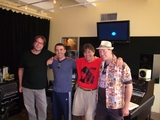
Audio Producer Gary Hertz, screenwriter Daniel Farrands, Ketchum, and Nutman. (Photo: Roger Danchick)
Jack Ketchum: There are two pieces of business at the end that were changed from the original script. Without delivering any spoilers, one involves Ruth and David and the other involves a cop. I think the business with the cop plays out too deaus-ex-machina and I told Bill and Andrew so after the preview. They said maybe they could fix it one way or another. I don't know if they have or not. The other business, between Ruth and David, might bother purists, but it doesn't bother me. In fact, some of my friends who both read the book and saw the movie felt that the movie fairly cried out for the change though even though the book certainly didn't. Different strokes for different media.
Dark Scribe: The voiceovers at the beginning and finale of the film are quite effective. Were these always intended or were they added during post-production?
Jack Ketchum: That was Phil and Dan's idea as I recall. They borrowed a lot of the language from the book and found new visuals for it. I think they work quite well.
Dark Scribe: With the expected success of this movie, do you foresee any future editions of the book hitting the market?

Jack Ketchum: Well, it's already available in hardcover, trade paperback, and mass market paperback. I suspect they'll go into further printings. Mass market already has. And I don't know if it's a direct result of the buzz from the movie or if it was somehow just in the air - Steve King's involvement certainly hasn't hurt any - but there are now new editions in translation from France, Germany and Spain.
Dark Scribe: One has to wonder why your first two adaptations (Girl and The Lost) are coming to audiences by means of independent filmmakers rather than from some of the bigger players with reputations for taking on edgier fare like Lionsgate, a company whose involvement might have paved the way for wider audiences to see these films at the local multiplex. Thinking back to the days when Stephen King’s Carrie was adapted to the screen and released to mainstream audiences, I’m curious to know your take on this.
Jack Ketchum: My take on it is that the big guys have gone all chickenshit on us since the days of Carrie. The indies haven't.
Dark Scribe: What do you say to folks who had a tough time finishing the book who might not be sure watching the movie will be any less challenging an experience?
Jack Ketchum: The movie won't be much nicer to you, folks. In each screening, I've seen people walk out. Some very 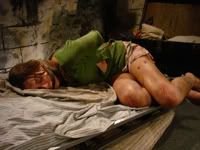 early on once they saw where the film was going, some having hung on nearly to the end. I figure if some people don't walk out on this story, the filmmakers haven't done their jobs and I know they feel the same. Just as if some people hadn't chosen to throw away my book in disgust, I wouldn't have succeeded in writing the book I wanted to write.
early on once they saw where the film was going, some having hung on nearly to the end. I figure if some people don't walk out on this story, the filmmakers haven't done their jobs and I know they feel the same. Just as if some people hadn't chosen to throw away my book in disgust, I wouldn't have succeeded in writing the book I wanted to write.
Dark Scribe: Much of your work doesn’t exactly end on a cheery note, often obliterating the idea of total resolution, patched holes, mended hearts, and eased pains. You’ve been quoted before as saying how sometimes bad things just happen and life is far from fair. It’s that harsh honesty that causes your work to linger long after it’s been experienced. Obviously The Girl Next Door and its film adaptation are no exceptions. But can a story like The Girl Next Door offer audiences any hope at all, or is this story the perfect example of hopelessness in the face of pure evil?
 Jack Ketchum: Someone once observed that my stuff is largely about loss and regret. I hadn't thought about it that way, but I have since and I think there's a lot of truth there. Certainly anybody my age, who's lived through the eras I've lived through, has experienced plenty of loss and has hopefully learned by now that life, at least in part, is about learning how to get through all that loss with a modicum of something like grace. It's what David as a man is trying to do in writing down the terrible events of that summer, writing about the loss of his first love. And he’s doing so on the eve of his third marriage, which he's hoping he won't screw up like he did the others. It's no coincidence that the story's told in the first person. It's essential. The Girl Next Door is a confession, which is supposed to be good for the soul, remember? Hopefully for David, it's also an exorcism. Maybe it'll even allow him to love again, who knows? He's still in there striving after all, isn't he? Still trying. Want to give him another chance? I do.
Jack Ketchum: Someone once observed that my stuff is largely about loss and regret. I hadn't thought about it that way, but I have since and I think there's a lot of truth there. Certainly anybody my age, who's lived through the eras I've lived through, has experienced plenty of loss and has hopefully learned by now that life, at least in part, is about learning how to get through all that loss with a modicum of something like grace. It's what David as a man is trying to do in writing down the terrible events of that summer, writing about the loss of his first love. And he’s doing so on the eve of his third marriage, which he's hoping he won't screw up like he did the others. It's no coincidence that the story's told in the first person. It's essential. The Girl Next Door is a confession, which is supposed to be good for the soul, remember? Hopefully for David, it's also an exorcism. Maybe it'll even allow him to love again, who knows? He's still in there striving after all, isn't he? Still trying. Want to give him another chance? I do.
Dark Scribe: What other Jack Ketchum works can our readers expect to see coming to the screen?
Jack Ketchum: The option for Ladies’ Night has expired and there never has been one for Right to Life. And production on 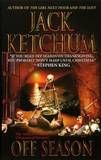 Red has stalled, with Lucky McKee now regrettably out of the picture. Lucky has an option on my script for The Passenger, though. But the only other books of mine currently optioned are Joyride and Off Season. I've seen drafts of both scripts and they couldn't be more different. Alan DiFiore's script for Joyride is very realistic and gritty and very true to the material. The script for Off Season is...well, we won't talk about the script for Off Season.
Red has stalled, with Lucky McKee now regrettably out of the picture. Lucky has an option on my script for The Passenger, though. But the only other books of mine currently optioned are Joyride and Off Season. I've seen drafts of both scripts and they couldn't be more different. Alan DiFiore's script for Joyride is very realistic and gritty and very true to the material. The script for Off Season is...well, we won't talk about the script for Off Season.
Dark Scribe: Our apologies if this last question flirts with redundancy as we’re sure you’ve been down this road many times doing press for the film, but how do you answer the critics inclined to label this film as just another cinematic exploitation of a terrible crime made in the name of money?
Jack Ketchum: I say see the film and then tell me that. If you have any brains or heart at all I suspect you'll think otherwise.
Visit the Official Movie Website for The Girl Next Door.
Purchase Jack Ketchum’s classic novel The Girl Next Door.




Reader Comments (2)
Great article. I'll have to add this to my long list of future reads.
Thanks,
Charles Day
Thanks for reading, Charles!